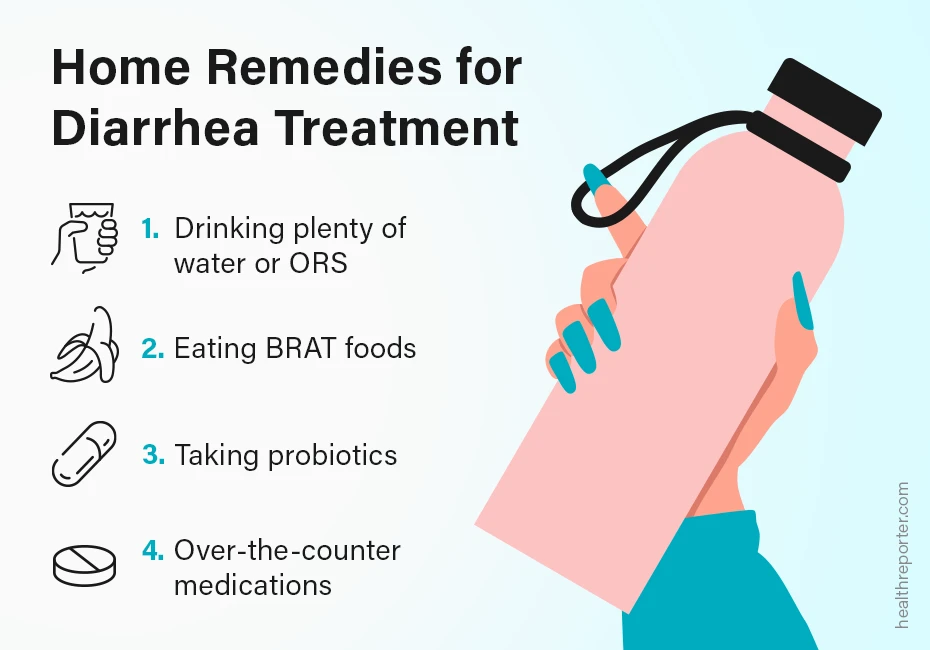Most Effective Diarrhea Treatments: Your Ultimate Guide to Finding Relief
Diarrhea can be an uncomfortable and sometimes embarrassing experience. However, these effective diarrhea treatments can offer quick relief.

Diarrhea can catch anyone off guard. A common digestive issue, it is characterized by the passage of loose, watery stools three or more times per day and might sometimes be accompanied by bloating, nausea, and stomach pain.
Various factors trigger diarrhea, from contaminated food to digestive tract problems and the use of certain medications.
Typically, most cases of diarrhea resolve within a few days once the triggering factor is eliminated. However, that doesn’t mean you shouldn’t try a few remedies to make the experience less uncomfortable.
When Should You Look for Diarrhea Treatments?
Diarrhea is classified broadly into acute and chronic diarrhea. Acute diarrhea mostly happens as a result of consuming food contaminated with infectious bacteria or parasites. It typically resolves on its own within a few days.
But if it doesn’t, seeking medical attention is advisable as it may lead to dehydration and other complications.
In addition, watch out for signs of dehydration, severe abdominal pain, high fever, blood or mucus in stools, and chronic diarrhea.
Chronic diarrhea lasts for more than two weeks. It may be indicative of complex underlying issues such as food intolerances, allergies, digestive tract problems, infections, prolonged use of certain medications, inflammatory bowel disease (IBD), or irritable bowel syndrome (IBS).
In such cases, it is essential to consult a healthcare professional at the earliest.
How Can You Stop Diarrhea Fast?
If you are experiencing diarrhea, the most important thing to do is stay hydrated and tweak your diet.
Diarrhea can lead to dehydration, so it is essential to replace lost fluids by drinking enough water, ORS, or other liquids.
Furthermore, consuming bland, easily digestible food can help stop loose, watery stools. On the flip side, avoid caffeine, fruits, vegetables, and greasy and spicy foods.
Probiotics and antidiarrheal medications can also be beneficial. Nonetheless, remember that the best option for treating diarrhea may depend on the underlying causes and severity of your symptoms.
4 Best Home Remedies for Diarrhea
Dealing with diarrhea is uncomfortable and inconvenient. The good news is that many effective diarrhea treatments can be done right at your home without rushing to the doctor’s office.

Here are 4 solutions that can provide quick relief:
#1 Hydration
Persistent diarrhea leads to fluid and electrolyte (sodium and chloride) loss, putting you at a greater risk of dehydration.
Common symptoms of dehydration include dizziness, thirst, muscle cramps, confusion, headache, and rapid heartbeat. In addition, dark yellow-colored urine is a huge indicator of severe dehydration.
For quick recovery, drink plenty of water throughout the day. Drinking oral rehydration solution (ORS) is also a good idea, as the sugar and salt contained in it will help your intestinal tract absorb water more efficiently.
You can easily prepare a solution for oral rehydration therapy at home by mixing 1 liter of water with 6 teaspoons of sugar and half a teaspoon of salt.
In addition, clear broth and sports drinks are also great remedies as they restore potassium and sodium levels. If you wish to make your own sports drinks, mix a teaspoon of salt with a quart of apple juice or any other fruit juice.
Nonetheless, avoid drinking liquids like caffeinated and sugary drinks, alcohol, and carbonated beverages, as they can aggravate diarrhea. Milk and other dairy products should also be avoided. It can worsen symptoms by causing temporary lactose intolerance.
#2 BRAT foods
A healthcare provider-recommended way to treat diarrhea is following the BRAT diet. BRAT stands for Bananas, Rice, Applesauce, and Toast. These are bland foods that are easy on your tummy.
They’re also low in fiber and high in starch, which helps bind stools together and leads to more stable bowel movements.
Furthermore, bananas are packed with potassium, a nutrient your body loses during severe diarrhea. Applesauce has pectin, which helps calm your digestive system.
Apart from the BRAT diet, you can also eat certain foods like oatmeal, boiled or baked potatoes, baked chicken, chicken soup, and similar.
It’s best to avoid fried, greasy, or spicy foods, as they can make diarrhea worse. Also, limit high-fiber foods like raw fruits and vegetables that can lead to bloating. These include Brussels sprouts, lettuce, cabbage, beans, berries, and avocados.
An important thing to remember is that the BRAT diet is highly restrictive and doesn’t provide your body with enough nutrients.
Therefore, even though it helps stop diarrhea, use it as a short-term remedy and return to your regular, balanced diet as soon as diarrhea symptoms subside, usually within 24–48 hours.
#3 Probiotics
Sometimes, diarrhea is caused by an overgrowth of harmful bacteria in the stomach. For instance, taking an antibiotic course wipes out bad and good bacteria in your digestive system, after which bad germs might be more successful in taking charge.
If that is the case, the condition can be overcome by introducing good bacteria or probiotics into your digestive tract.
Probiotics are gut-friendly microorganisms that keep your digestive system running smoothly. A recent study involving 8,000 people found probiotics to make severe diarrhea go away faster. Plus, they were safe and hardly caused any side effects.
Probiotics are found in certain foods like yogurt, cottage cheese, sauerkraut, kombucha, kimchi, and similar. You can also buy them over the counter as powder or pills.
However, when you purchase probiotic supplements, ensure you get them from a trustworthy source since the FDA doesn’t watch over probiotics like medicine. If you’re unsure, consult your doctor or pharmacist.
A specific strain of probiotics to consider is Saccharomyces boulardii. It is a probiotic yeast that is particularly efficient in treating traveler’s diarrhea and antibiotic-associated diarrhea.
#4 Over-the-counter medications
Over-the-counter medicines like Bismuth subsalicylate and Imodium quickly relieve diarrhea.
Bismuth subsalicylate reduces inflammation in your intestines by balancing fluid movement.
On the other hand, Imodium contains loperamide that slows down food movement through your gut. It helps your body absorb nutrients and fluids, adding bulk to your stools and reducing the chances of unexpected bowel movements.
Nevertheless, it is important to note that Imodium is ideal for short-term relief from acute diarrhea symptoms. It doesn’t address the underlying conditions, so if your diarrhea lasts longer than two days, seek medical attention.
In addition, while over-the-counter medications can effectively treat occasional diarrhea, including traveler’s diarrhea, if your diarrhea is caused by bacteria or parasites, taking antidiarrheal medications may worsen your symptoms.
Hence, consult your healthcare provider before taking any over-the-counter medications, especially if you are on prescription medicines.
Worst Foods to Eat With Diarrhea
When you have diarrhea, you must be mindful of what you eat to avoid worsening your condition. As stated earlier, bland, easy-to-digest foods, like boiled potatoes, rice, and plain crackers, make a good choice.
Any food that is dehydrating, hard to digest, or produces gas should be avoided. This includes:
- Deep-fried foods like french fries, donuts, fried chicken
- Dairy products like milk, cheese, and ice cream
- Spicy and sugary foods
- High-fiber foods like whole grains, bran, some raw fruits, and vegetables
- Food containing artificial sweeteners like sorbitol and mannitol
- Caffeinated drinks, including coffee and tea
- Alcohol and carbonated drinks
When should you seek a doctor for diarrhea?
In most cases, acute diarrhea resolves within a few days. However, if it lasts more than two days, it’s a reason to consult a healthcare provider. You should also see a doctor if you notice any of the following symptoms:
- Signs of dehydration, such as dry mouth, dark urine, dizziness
- Blood or pus in the stool
- Black and tarry stools
- High fever (above 102F)
- Severe pain in the abdomen (might be a sign of IBS or IBD)
- Unexplained weight loss
A Word From Our MD


Diarrhea is a condition that affects most people at least once in their lifetime. While it isn’t a serious condition, it can disrupt your daily life. Luckily, it can be managed and treated at home for the most part.
Start by making lifestyle changes to help bulk up your loose, watery stools. This can be done through eating low-fiber, high-starch food. Also, this is one time when you should avoid consuming certain fruits and vegetables that cause your stomach to bloat with gas.
In addition, rather than having three big meals a day, stick to smaller and more frequent meals. You can also take probiotics or antidiarrheal medications.
However, remember that several factors can cause diarrhea, and treating underlying conditions is imperative for complete recovery and achieving optimal gut health.
FAQs
The quickest way to treat diarrhea is by following simple measures like drinking plenty of clear fluids and eating small bland meals. A few studies also suggest taking probiotics to help relieve diarrhea faster than average. Nonetheless, people with chronic diarrhea should avoid dairy products, even if they contain probiotics.
Acute diarrhea lasts a few days, while chronic diarrhea might take several weeks to resolve. It’s important to look at your symptoms carefully and see a doctor if you notice blood in your stool, high fever, or signs of severe dehydration.
When you have diarrhea, drink a lot of clear fluids like water, broth, oral rehydration solutions (ORS), and fruit juices. Avoid caffeine, alcohol, soda, or beverages containing a lot of sugar until your diarrhea improves.
Conclusion
Diarrhea is an unpleasant condition, but with the right treatment options, you can effectively manage this common digestive issue.
Remember that the most effective diarrhea treatment may vary from person to person, as causes and symptoms can differ, so it’s advisable to experiment with different home remedies.
Nonetheless, if diarrhea persists for an extended period, don’t hesitate to contact a healthcare provider for a proper diagnosis and treatment plan.

















































 Select your language:
Select your language: 









